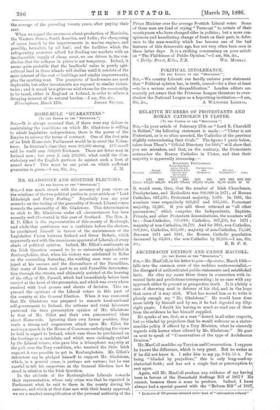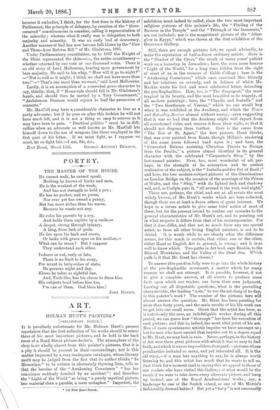ARCHDEACON DENISON AND CANON MACCOLL.
[TO THE EDITOR OP THE " SPECTATOR."] MacColl, in his letter to you—Spectator, March 13th— falls into the common error of the reckless controversialist,— the disregard of authenticated public statements and established. facts. He cites my name three times in connection with in- vented facts and predictions corresponding ; in no case with any approach either to present or prospective truth. It is plainly a case of throwing mud in defence of his idol, and in the hope that some of it may stick. What has moved him so to write is plainly enough my " Mr. Gladstone." He would have done more fairly by himself and by me, if he had digested my fifty- eight pages. I doubt his having so much as read one of them from the evidence he has himself supplied.
He speaks of me, first, as a man " honest in all other respects,.
but so blinded by prejudices that he would welcome as a states- manlike policy if offered by a Tory Minister, what he sincerely regards with horror when offered by Mr. Gladstone." He goes on next to speak of "Conservatives of the type of Archdeacon Denison."
Mr. MacColl muddles up Toryism and Conservatism. I suppose
he knows the difference, which is very great. But he writes as if he did not know it. I refer him to my pp. 9-10, 53-4. For being " blinded by prejudices," this is only long-used-up rhetorical froth ; and has not a single fact or presumption to rest upon. Again, will Mr. MacColl produce any evidence of my having been in favour of the Household Suffrage Bill of 1867 ? cannot, because there is none to produce. Indeed, I hay always had a special quarrel with the "Reform Bill" of 1867i,
• Exclusive of 530 persons returned under head of "Information refused." because it embodies, I think, for the first time in the history of Parliament, the principle of delegacy, by creation of the " three- cornered" constituencies in counties, calling it representation of the minority ; whereas what it really was is delegation to both majority and minority. It was an early bud of democracy. Another manner of bud has now become fall-blown by the " Cow and Three-Acre Reform Bill " of Mr. Gladstone, 1885.
Under Parliamentary constitution, up to 1867 the Knight of the Shire represented the shire—i.e., the entire constituency— whether returned by one vote or one thousand votes. There is an old story of Lord Melbourne, bearing upon government by bare majority. He said to his whip, " How will it go to-night?" —"Not so well as it might; I think we shall not have more than two !"—" That's one more than we want," said Lord Melbourne.
Lastly, it is an assumption of a somewhat gross character to say, thirdly, that, if " Home-role should fail in Mr. Gladstone's hands, and should then be carried by a Tory Government," "Archdeacon Denison would rejoice to lead the procession of converts."
Mr. MacColl may have a considerable character to lose as a party advocate; but if he goes on after this fashion he will not have much left, and it is not a thing so easy to recover as it
may have been to gain. Practical politics " must be in diffi- culties when an advocate so well known as Mr. MacColl lets himself down to the use of weapons like those employed in the first part of his letter. If we must fight, as I suppose we must, let us fight fair.—I am, Sir, &o.,



































 Previous page
Previous page